- Home
- Fredric Brown
The Mind Thing Page 14
The Mind Thing Read online
Page 14
The cat looked at the box of sawdust but stayed at the door. “Miaouw,” it said. Very plaintively.
“You’re an outdoor cat, maybe, and never used a sawdust box?” Doc asked it. “Well, you’ll learn, when the pressure gets high enough.”
He took his breakfast dishes to the sink and started washing them.
“Tell you what, Cat,” he said over his shoulder. “Let’s give it a try together, for a few days. For that length of time, I’ll clean up if you don’t figure out how to use the sawdust.
“And if you turn out to like me and I turn out to like you, then I’ll give you your choice—you can go out, and come back if you wish or never darken my doorway again. Fair enough?”
The cat didn’t answer, except possibly by not answering; it stayed by the door.
Doc decided to go about the things he had to do and pay no more attention to it for a while, to see what it did.
* * *
The mind thing, helpless in the cat-body of which it could not rid itself without giving away more than it already had, stayed by the door. The bladder- and bowel-pressure were considerable by now. And Staunton obviously wasn’t going to let him out of the house. He didn’t feel, except in the objective sense of being aware of, the pain of the body he was in; but that was not the problem. Staunton expected to keep him shut up for several days. He had to let this body evacuate itself before then or the very fact that it had not would he an additional cause for suspicion. Staunton had more than enough already. The question then was whether to use the floor or the box. If he pretended to be strictly an outdoor cat, unused to using a sawdust box, and dirtied the floor now and as often as he could, would that disgust Staunton and cause his release earlier than if he pretended to be housebroken to the extent of using the box?
He watched Staunton emotionlessly—not hating him, because the emotion of hatred was as alien to him as the feeling of mercy—except, in both cases, toward his own kind.
Suddenly a thought came to him. Staunton, with his suspicions already aroused, might well make an attempt to find out where the cat he was using had come from, who had owned it, how and when it had disappeared. And other facts about it—including the degree of its being housebroken. Any discrepancy would make Staunton still more suspicious. The mind thing knew he should examine the mind of his current host and let his actions as a cat correspond with what that particular cat would do under given circumstances, and guide his actions accordingly.
It took him only a second to locate that particular memory in the cat’s brain. He walked over to the sawdust box.
Staunton, at the sink, glanced down casually. “Attaboy,” he said. “Nice kitty.”
Yes, the mind thing knew that this was what he should have done all along, examined the mind of his particular host and acted as the host would have acted under the same circumstances, any time he was under observation. Had he only done that yesterday when the woman had that seen him in the hallway—walked out into the kitchen and looked at the two of them calmly, instead of hiding…
This chore taken care of, he thought what he should do next to play his part to the hilt. He’d lie down and sleep a while, probably. Find a soft comfortable place to rest in. There was a sofa in the living room. He padded through the doorway, jumped up onto the sofa, and curled himself up comfortably.
Staunton was standing there in the doorway. “Okay, Cat,” he said. “Might as well make yourself at home. What made you hide yesterday and last night?” Then he went back into the kitchen.
The mind thing let his cat-body rest and sleep, but his own mind was thinking what a fool he’d been, letting himself panic, and hiding twice, once when the woman had seen him in the hallway, once when, after he’d walked through the flour, Staunton had come home after midnight.
He let himself explore his host’s mind thoroughly now, at leisure. Losing a few days being shut up here would be an annoyance but still only a minor delay. Apparently Staunton wasn’t going to try him out with specific psychological tests, but just keep him under general observation. It should be easy for the mind thing, now that he knew what he had to do.
It was beginning to get a little warm and Staunton was going around opening all of the downstairs windows—but each only a carefully calculated scant two inches, just enough so a medium-small cat couldn’t get through.
A little later, Staunton was looking down at him. “Cat,” he said, “I’m going downtown a while; you hold the fort. I’ll pick up some cat food or liver or something. While you’re here, I might as well be the perfect host.”
The mind thing almost made his present host jump; then he realized Staunton was using the word “host” in a different sense. He blinked at him sleepily.
When Staunton walked to the front door he jumped off the sofa and ran after him, to stay in character. But Staunton reached down a hand and took him gently by the scruff of the neck—the first time there had been physical contact between them—and held him back until he was able to get the door closed from the outside, with the cat inside.
* * *
In Bartlesville Doc made his first stop at the office of the Clarion.
Hollis looked up from the typewriter he’d been hammering. “Hi,” he said. “What’s new?”
“Nothing startling, Ed. Just wanted to ask you a question. Know anybody looking for a missing cat?”
Hollis laughed. “A cat? Cats are a dime a dozen around here. If one wanders off, it wanders off. Why? You find one?”
“Yes. And thought I might keep it a while if it wants to stay with me. But I wouldn’t if I knew whoever owned it really wanted it. It might be a child’s pet, for instance.”
“There’s that. Well, I can run an ad in the lost and found column for you. Deadline for that is Friday noon; that’s when we start closing the forms.”
Staunton thought a moment. He might as well save stopping in again by giving Hollis the ad now. He said, “Okay, I’ll give you the ad now. ‘Found, small gray cat.’ And give it a box number; I’ll check with you next week to see if there’s been an answer.”
“Sure.” Hollis jotted it down on a pad. “But hey, I know whose cat it might be. I was out at Kramer’s last week and he had a small gray cat, among several others. That’s out your way, so it might be his.”
“Just where out my way?”
“Next door to the Gross farm. You know where that is; heard you were out there with the sheriff after the suicide. It’s the farm east of theirs; Loursat has the one to the west.”
“Thanks, Ed. I’ll drop in on my way home to find out. You run that ad, though, unless I tell you not to. So long.”
When he did his shopping, Doc bought two cans of cat food. One can was surely enough for a cat that size for two days so two cans would run him until he let the cat out to see if it would stay around and come back, or would run away.
From the drugstore he phoned Miss Talley to ask her whether she was still sure she’d be done by Thursday noon, and whether she’d learned anything new. Yes, she was sure she’d be finished by the time she’d predicted, and no, she’d learned nothing interesting; she wouldn’t have much chance to put or keep her ear to the ground until she’d finished the typing.
And, she wanted to know, had he found a cat at his house? He told her about the cat and about his decision in connection with it.
On his way home he stopped at the farm east of the Gross farm. There were two cats on the front porch. Both were about the same size as the gray one and could easily be from the same litter.
A plump, friendly woman answered his knock on the door.
“I’m Ralph Staunton,” he told her. “I live in the last house down the road. I—”
“Oh, yes,” she said. “I’ve heard your name, and I’ve seen you drive past. Won’t you step in?” She moved back to make way for him.
“I might as well, but just for a moment. It’s nothing very important, Mrs. Kramer. I hear you have a gray cat. I’ve found one, about the size of those two cats on the porch and I wonde
red—”
“Oh, yes. I hadn’t seen him for a day or two and wondered if anything had happened to him.”
“Nothing has, except that he wandered into my house. Thought I might like to keep him. Would you consider selling him?”
She laughed. “Sell him? Oh, goodness no. But you can have him if you want him. We’ve got three other cats—our old cat had a litter of six last time and we were able to find homes for only three of them. And she’s going to have another litter soon.” She shook her head. “I’m afraid after that we’re going to get rid of her or take her to the vet and have her spayed. Else we’ll be drowning in cats.”
“Thanks a lot,” Doc said. “I’ll be glad to take him, and I’ll promise to find a home for him when I leave at the end of the summer—or take him back with me if I can’t. That is, if he stays with me.”
“But I thought you said—”
“I’ve got him shut in the house right now, to see if he’ll get used to it and to me and want to stay. But I can’t do that forever so in a few more days I’ll have to let him out—and we’ll have to see whether he’ll want to stay with me or come back to you. I can’t very well keep him against his will; cats are very independent people.”
“Oh dear. I guess you’re right, but I do hope he’ll stay with you. His name is Jerry, by the way.”
“Not any more, if he stays with me,” Doc said. “I’ve given him a new name. I call him Cat.”
Mrs. Kramer laughed.
* * *
The cat must have heard Doc Staunton coming because it was waiting inside the door and tried to get past him, but he managed to catch it. “No, Cat,” he said, this time taking it up in his arms and kicking the door shut with his foot. “I explained that to you; you’re in stir for a few days. Then you can make up your mind whether you want to keep on being Cat with me, or go back to being Jerry with the Kramers. I know who you are now, you see.”
He put it down on the sofa and stood looking down at it. “Or do I?” he added softly.
It wasn’t until he went to open a window wider and remembered in time not to, that it occurred to him that he’d forgotten to check on getting screens fitted while he was in town. Well, he’d be in town again tomorrow; one day wouldn’t matter.
CHAPTER SIXTEEN
One day didn’t make the slightest difference, it turned out, on his ordering the screens. He went into town again the next day, Thursday, and saw Hank Purdy, the town’s only really good rough carpenter. He learned that Hank had more work than he could handle for at least a week. He promised to come out later the following week, take measurements and make an estimate. Doc might have found someone else who could do the job sooner, but he liked Hank, whom he knew from the poker games in the back room at the tavern, and decided he’d rather wait and have Hank do the job. After all, he wasn’t going to keep the cat shut up more than another few days, and after that the house would be in no more immediate need of screens than it had been all along. Besides, the weather was mild and having the windows as they were now, each of them raised about two inches, provided plenty of ventilation.
He parked the station wagon in front of Miss Talley’s little house. She must have seen him stopping there, because she had the door opened before he reached it.
“Come in, Doctor. All ready for you. Sit down, and I’ll bring the manuscripts. And my notebook.”
“Thanks, Miss Talley, but I don’t think I’m going to dictate those two letters today. I’ve decided I want a few days to think things over before I send them. And I may as well wait to write until I’m ready to mail them; something else might happen and I can put any subsequent information in the letter.”
“All right, if you think so.” She picked up a large brown envelope and gave it to him. “Want to read this now anyway?”
He shook his head. “Might as well read it at home. I’d rather talk a few minutes, if you’ve time.”
She had time, she told him. He told her about the cat. “I started out being scared of it, or about its being there.” He laughed. “You and your talk about possession did that to me, I suppose. But now I feel just the opposite. I hope it sticks around; it keeps me from getting lonesome, I think it’s a perfectly normal cat, Miss Talley.”
“And Buck was a perfectly normal dog, until he ran under your car. In spite of what you say, Doctor, I’m a little worried about its living there with you. I suppose it’s silly of me, but—I do worry.”
“I’ll be all right, Miss Talley. I’m afraid I’m beginning to think we both went a bit overboard on this.”
“Possibly, Doctor… Will you promise me you’ll send those letters, and the reports, to the two friends you mentioned?”
Doc sighed. “All right, I’ll send them. Just want a couple of days to think it over first.”
“All right. For the rest of this week I’ll be staying home, that is, early afternoons; so any day you want to come and dictate them… ”
That evening after he had finished washing the dishes he went into the living room and sat on the sofa; the cat was already there and he reached over and stroked its sleek fur. The cat purred.
“Well, Cat, getting to like it here? And to like me? Let’s see; this is Thursday evening. Let’s set a date for giving you your choice, a date and an hour. How does Monday strike you? Let’s see; I’ve been feeding you about the middle of the afternoon. I’ll let you go out—if you still want to go out—about the middle of the morning. That’ll give you time to think it over before you get hungry again.
“If I go into town I won’t stay long, I’ll go when I let you out, and be back by noon. Waiting and ready to feed you if you come back. Fair enough?”
The cat didn’t answer, but it still purred.
Doc said, “If it relieves a worry on your part, the Kramers gave you to me; they don’t want you back. Oh, they’ll take you if you want to go home to them. They’ll feed you, and forgive you.
“Yes, I know who you are, and that your name was Jerry there. Might have kept that name if another male cat had come with you. I’d have called him Tom. Tom and Jerry. Ever tasted one? They’re good. But that’s irrelevant. Which are you going to prefer, the Kramers or me?”
He got up and took a comfortable chair facing the sofa. He stared at the cat from across the room.
“Cat, why did you hide? Why did you come in an upstairs window? Don’t you know cats just don’t do that? Damn it, why didn’t you act all along as you’re acting now?”
The cat stretched languorously and then curled up again and closed its eyes.
“Cat.” Doc said it sharply and the cat opened its eyes again and stared at him.
“Cat, don’t go to sleep on me. I’m talking to you, and sleeping isn’t polite when you’re being spoken to. Cat, you used to live on the farm next to the Grosses. Did you know their cat? The one that committed suicide the night Gross did? Don’t tell me it wasn’t suicide, that cat jumping right into the jaws of a vicious dog it must have known was there. If it was suicide, why? And if it wasn’t, what was it?”
The cat’s eyes had closed, but somehow Doc felt that it wasn’t asleep.
“And an owl killed itself that same night. What do you know about that? And before that, along with Tommy Hoffman’s death we had a field mouse that got itself killed, seemingly deliberately. And a dog. Do you know that I was the one who ran over the dog? And that it had been hiding beside the road until my car got just the right distance away—only a few yards—and then ran right under my wheels? I’ll swear that one was deliberate—especially since they tell me that dog was car-shy.
“Two human beings, four animals—that we know of. Of course any other human suicides we’d know about, but how many more animals, especially ones out in the woods and not under observation, might have brought about their own deaths recently after— After what? After they’d served the purpose of whoever, or whatever, was using them?”
Outside, crickets were chirping, thousands of crickets. Doc’s mind wandered and he tho
ught how strange it was that one could tell the temperature, almost exactly, by timing the interval between the chirps of a cricket. A cricket was a thermometer, and probably as accurate as the average household thermometer. There were many strange things in nature. Lemmings, with their periodical suicidal migrations to and into the sea. Group insanity? Or do the lemmings know something that we don’t know?
He heard the crickets, watched the black night press against the window pane. He turned back to the cat.
“Cat,” he said, “why did those other animals kill themselves? If you’re like them, why don’t you? Is the only reason you’re alive the fact that there isn’t any way of killing yourself shut up here? Wait a minute, I’ll find out.”
He left the living room and went across the hall and into the third downstairs room, a small room that was only partly furnished and used mostly for storage. Except for items that were already there, Doc used it only to store his fishing tackle and boots, his guns and ammunition. Although he knew there was open season on nothing worth hunting in Wisconsin in summer, he’d brought a pistol and a rifle for target practice and a shotgun mostly because it was a brand new one and he wanted a chance to try it out. All these things he’d had shipped ahead of him before his flight to Green Bay; he’d picked them up there after he’d bought the used station wagon which he’d sell before flying back at the end of the summer.
He took the pistol, a .38-caliber S. & W. Special and took a cardboard rifle target from a package of them. In the doorway between the hall and the living room he put the square of cardboard down on the floor and went back to the chair he’d been sitting in. He cocked the gun and saw the cat raise its head at the sudden click.
“Listen, Cat,” he said, “let’s try this for size. If you’re only wanting out of here so you can find a way to kill yourself, I’ll save you the trouble. If you understand what I’m saying and want me to shoot you, prove it by going to the doorway there. Sit down on that target, that’s all you have to do.”

 Hall of Mirrors
Hall of Mirrors Honeymoon in Hell
Honeymoon in Hell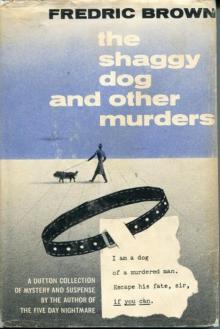 The Shaggy Dog and Other Murders
The Shaggy Dog and Other Murders The Far Cry
The Far Cry Arena
Arena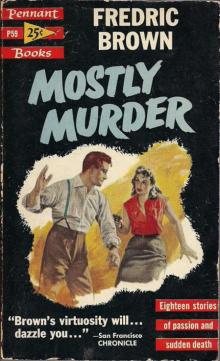 Mostly Murder
Mostly Murder The Geezenstacks
The Geezenstacks The Yehudi Principle
The Yehudi Principle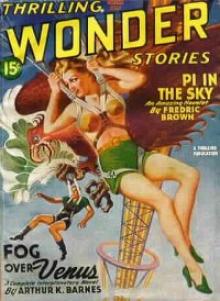 Pi in the Sky
Pi in the Sky Eine Kleine Nachtmusik
Eine Kleine Nachtmusik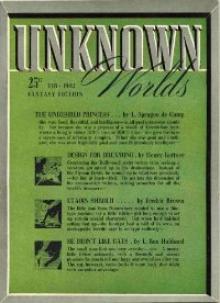 Etaoin Shrdlu
Etaoin Shrdlu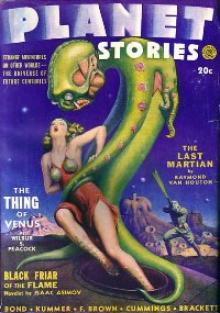 The Star Mouse
The Star Mouse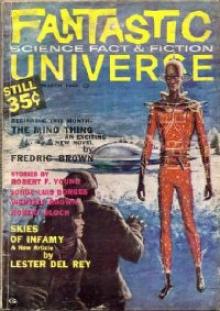 The Mind Thing
The Mind Thing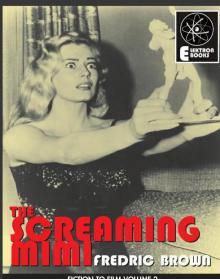 The Screaming Mimi
The Screaming Mimi The Fabulous Clipjoint
The Fabulous Clipjoint Puppet Show
Puppet Show It Didn't Happen
It Didn't Happen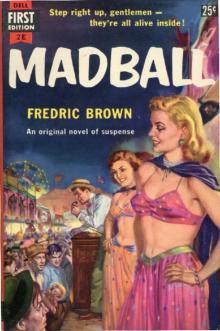 Madball
Madball Happy Ending
Happy Ending The Fredric Brown Megapack: 33 Classic Science Fiction Stories
The Fredric Brown Megapack: 33 Classic Science Fiction Stories Rogue in Space
Rogue in Space Night of the Jabberwock
Night of the Jabberwock The Dead Ringer
The Dead Ringer Knock
Knock We All Killed Grandma
We All Killed Grandma Space On My Hands
Space On My Hands The Collection
The Collection The Second Fredric Brown Megapack: 27 Classic Science Fiction Stories
The Second Fredric Brown Megapack: 27 Classic Science Fiction Stories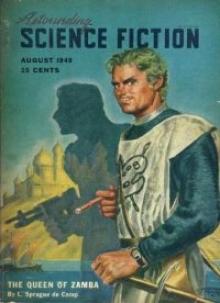 Letter to a Phoenix
Letter to a Phoenix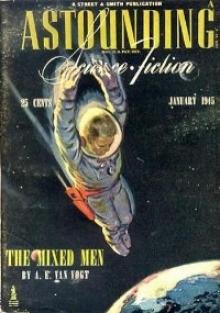 The Waveries
The Waveries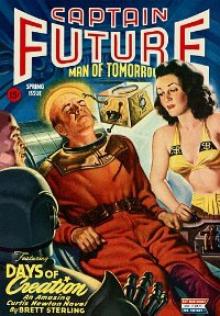 Nothing Sirius
Nothing Sirius The Deep End
The Deep End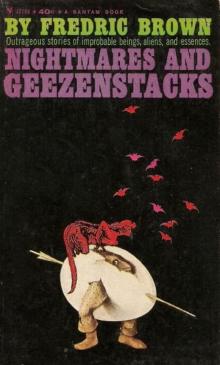 Nightmares & Geezenstacks
Nightmares & Geezenstacks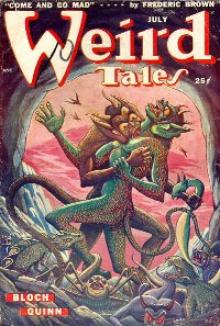 Come and Go Mad
Come and Go Mad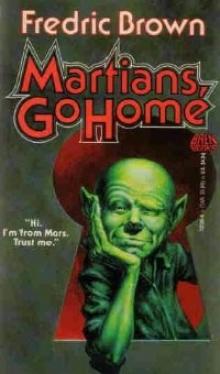 Martians, Go Home
Martians, Go Home